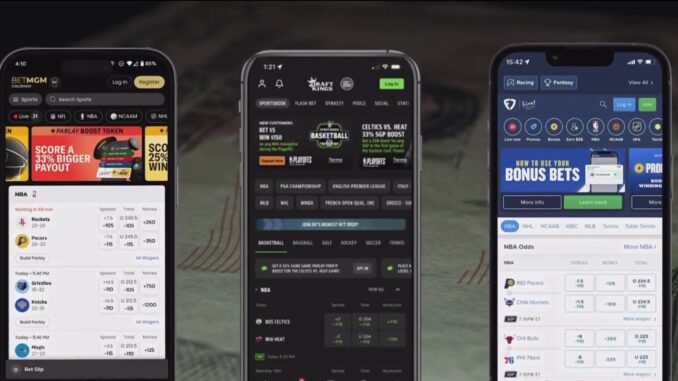
By Sean Markisic
The practice of betting on sports games was always viewed as a taboo and unethical activity by sports leagues in the past since it was illegal. Sports gambling was first made legal in the United States in May 2018, and since then, it has slowly become more commercialized and even embraced by sports leagues. Betting on sports has created an entire new avenue of revenue for leagues, and as a result it has altered the fan perspective on the games they watch, changing the relationship between fans of their games.
Sports betting truly became a phenomenon in the early to mid 1990’s which appended to coincide with the rise of internet access. As explained by Delasport, the 1990’s saw the first online sportsbook that was created which allowed for a larger audience to interact with it. Fast forward to the 2000’s, people were able to place bets with each other, and in addition place bets while games were going on; in theory this gives them a better chance at making the right bet. By the time the early 2010’s arrived, sports betting was available for any and all sports, which opened the door for more people to get in on the action.
Tuning into any game for American sports leagues will lead to the average viewer having sports bets thrown in their faces. Commentators always give the betting at the start as well as throughout the game. Some might just see these bets and ignore them, whereas others will see it being fed to them and will want to get in on the action to see if they can make a profit from a quick bet.
Sports gambling has become commonplace in society and led to the growth in a large number of sports betting apps such as FanDuel, DraftKings and Bet365. Additionally, there are a variety of bets that people can make. Instead of making one bet, people have the option of waging their money on multiple bets. Even though it decreases their chance of winning, it can lead to high rewards. People subconsciously jump at the idea of this option without thinking of the risk, which can lead to losing out on a large sum of money.
People were persuaded by sports betting because it provides them with an adrenaline rush, and the sports leagues are profiting off of it no matter what. Sports leagues have embraced gambling and partnered up with them in order to advertise it since it’s now legal. In addition, players becoming involved in sports gambling has started to become quite controversial. In Major League Baseball, star player Shohei Ohtani of the Los Angeles Dodgers was accused of paying off gambling debts for his Japanese interpreter Ippei Mizuhara.
“I never bet on baseball or any other sports or have never asked somebody to do that on my behalf. And I have never went through a bookmaker to bet on sports,” Ohtani said in a press conference on March 25. “Ippei never revealed to me that there was this media inquiry. Ippei told the media and to my representatives that I, on behalf of a friend, paid off debt.”
This controversy unveils a whole new side of gambling that viewers rarely see. It creates a whole new dynamic in sports leagues, which is that they are perfectly fine with fans betting on games, but look down upon it when players do so; it’s a double standard for those in the sporting world.
Sports gambling was at one point an illegal practice that was kept under wraps. While no longer illegal, it remains to be seen if it will end up creating illegal practices itself.
